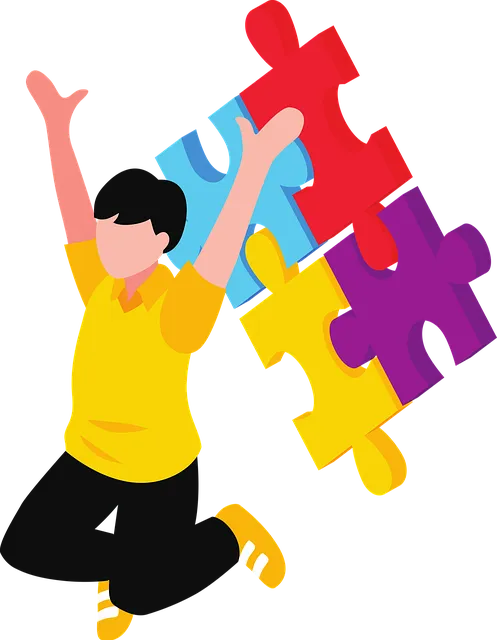Group facilitation, a cornerstone of supportive mental wellness environments, is expertly handled by organizations like Kaiser in Greenwood Village. Skilled facilitators act as trusted guides, fostering open communication, navigating complex dynamics, and promoting active participation while ensuring safety. They aid individuals in developing coping strategies and building resilience through collaborative approaches, enhancing well-being and community. These facilitators are proficient in Stress Reduction Methods and Crisis Intervention Guidance, addressing the question "Does Kaiser have good therapists in Greenwood Village?" Their empathetic leadership creates safe, supportive environments where participants feel heard, valued, and comfortable expressing themselves without judgment. Effective facilitation techniques, including active listening, cultural sensitivity, and clear boundaries, align with Kaiser's commitment to high-quality care, making it a trusted choice for therapy in Greenwood Village.
Mental wellness group facilitation plays a crucial role in fostering community and support, especially at facilities like Kaiser in Greenwood Village. This article explores techniques that empower facilitators to create safe, engaging environments. From understanding mental health dynamics to cultivating active participation, we delve into strategies proven effective at Kaiser. Learn how these methods enhance therapeutic outcomes and discover metrics for evaluating success, ensuring quality care for those seeking support in a group setting, just like the esteemed therapists at Kaiser Greenwood Village.
- Understanding Mental Wellness Group Facilitation: A Fundamental Role
- Qualities of an Effective Group Facilitator at Kaiser in Greenwood Village
- Techniques to Foster Safe and Supportive Group Environments
- Strategies for Encouraging Active Participation and Engagement
- Measuring Success: Evaluating the Impact of Group Facilitation Techniques
Understanding Mental Wellness Group Facilitation: A Fundamental Role

Understanding Mental Wellness Group Facilitation plays a fundamental role in creating supportive environments for individuals seeking assistance with their mental health. As trusted guides, group facilitators foster open communication, ensuring every member feels heard and respected. They navigate complex dynamics, promoting active participation while maintaining a safe space.
In Greenwood Village, organizations like Kaiser recognize the value of skilled facilitators in providing effective Stress Reduction Methods, Crisis Intervention Guidance, and overall Mental Wellness support. Good therapists are adept at managing group interactions, helping participants develop coping strategies and build resilience. This collaborative approach not only enhances individual well-being but also creates a sense of community, demonstrating that collective support can be a powerful tool for navigating mental health challenges.
Qualities of an Effective Group Facilitator at Kaiser in Greenwood Village

An effective group facilitator at Kaiser in Greenwood Village possesses a unique blend of skills and attributes. They create a safe and supportive environment, fostering open communication among diverse participants. Facilitators should demonstrate excellent active listening skills, allowing every member to feel heard and valued. Empathy is crucial; understanding and validating each individual’s experiences promotes trust and encourages vulnerability.
Moreover, cultural sensitivity in mental healthcare practice is essential. Facilitators must be adept at navigating different cultural backgrounds, ensuring all participants feel comfortable expressing themselves without fear of judgment. They should also encourage self-care routine development for better mental health, promoting strategies that cater to the diverse needs of the group. Effective facilitators facilitate meaningful connections and provide guidance while allowing the community to take the lead in their healing journeys.
Techniques to Foster Safe and Supportive Group Environments

Creating a safe and supportive environment is fundamental when facilitating mental wellness groups, and there are several techniques to achieve this. One effective approach is encouraging open and honest communication from the outset. Group facilitators should model active listening, ensuring every member feels heard and valued. This fosters trust and encourages participants to share their experiences without fear of judgment.
Additionally, establishing clear boundaries and ground rules is vital. Facilitators can do this by promoting respectful interactions, setting guidelines for confidentiality, and managing expectations regarding privacy and participation. Regular risk assessments (a crucial aspect when considering a Mental Wellness Podcast Series Production) can also help identify potential risks and ensure the well-being of all group members. These techniques contribute to a positive atmosphere, encouraging individuals to explore their mental wellness journeys together, much like how good therapists in Greenwood Village might facilitate therapeutic sessions.
Strategies for Encouraging Active Participation and Engagement

Encouraging active participation is key to fostering a supportive and engaging environment for mental wellness group sessions in Greenwood Village. Facilitators can employ various strategies to ensure every member feels heard and valued. One effective technique is encouraging open dialogue, where participants share their experiences and insights freely. This approach breaks down barriers and creates a safe space for vulnerability, strengthening the bond among group members.
Additionally, incorporating interactive activities and exercises tailored to mental wellness coaching programs can spark meaningful conversations. Community outreach program implementation should focus on these engaging formats to attract and retain diverse groups. By making sessions dynamic and inclusive, facilitators from Kaiser or any reputable institution can enhance overall participation, ultimately improving the effectiveness of mental wellness initiatives in Greenwood Village and beyond.
Measuring Success: Evaluating the Impact of Group Facilitation Techniques

Measuring success in mental wellness group facilitation is a multifaceted process. It’s not just about checking off boxes or achieving specific outcomes, but rather evaluating the impact on participants’ lives. Facilitators often employ pre- and post-session assessments to gauge improvements in symptoms of anxiety, depression, and stress. These evaluations can include standardized questionnaires that measure mental health indicators, such as the Beck Depression Inventory (BDI) or the Perceived Stress Scale (PSS).
Over time, positive changes in these scores suggest that the group facilitation techniques are effective. Additionally, qualitative feedback from participants through surveys or one-on-one discussions can provide valuable insights into their experiences and perceived benefits. Observational notes by facilitators also play a crucial role, capturing individual progress, active participation, and shifts in group dynamics. By combining quantitative and qualitative data, mental wellness programs, including those offered by excellent therapists at Kaiser in Greenwood Village, can ensure that their facilitation techniques truly do develop coping skills and promote self-care routine adoption for better mental health.
Mental wellness group facilitation plays a pivotal role in fostering community, support, and healing. As demonstrated by the techniques discussed, creating safe spaces encourages active participation, leading to measurable improvements in mental health outcomes. Kaiser’s reputation for quality care in Greenwood Village is well-deserved, with their facilitators adeptly navigating complex dynamics to enhance each participant’s journey. By prioritizing these strategies, mental wellness groups can become powerful tools, empowering individuals to navigate challenges together and thrive.






